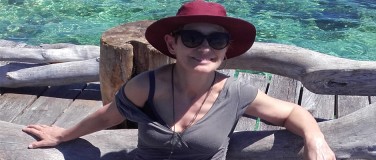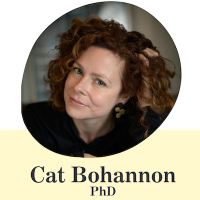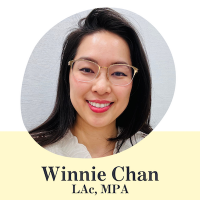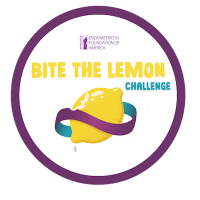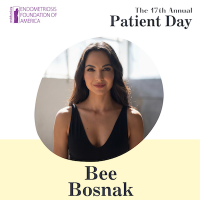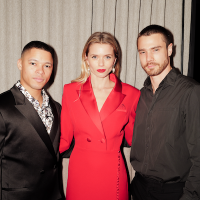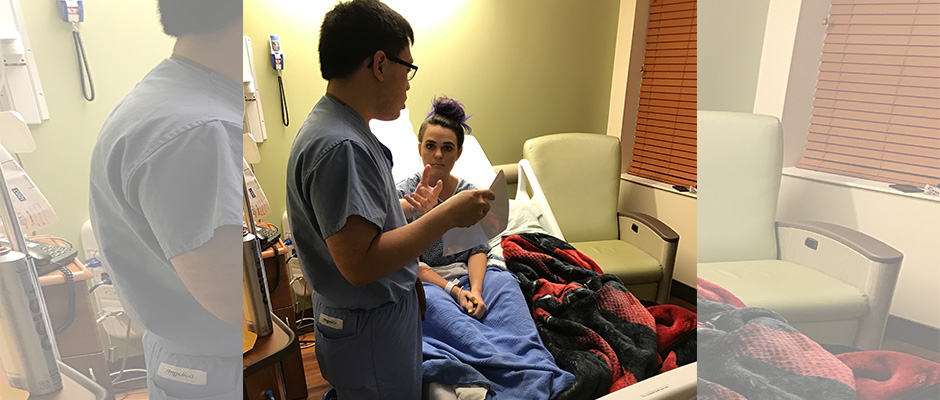
By Lea Ervin
“Do you think you can make it to Birmingham? It’s better if we go to Birmingham.”
The look on his face resembled a child, one who is peeking over the back seat of the family station wagon observing his beloved pet dog lying on a blanket in agony—ever so often a jolt breaks the cadence of labored panting with a brief whine. The child’s eyes show a fear of the unknown—will Fido come home with us after this visit to the veterinarian?
Brad and I hadn’t been married long when he first witnessed my endometriosis flare. He reached his hand over, placed it on my outer thigh and squeezed in an attempt to offer comfort and solace. Strands of my hair clung to the dampness of my face as I rested my hooded head on the passenger seat window. My knees rested on the interior door handle and the heated leather seats warmed my socked feet planted firmly in the center. My hands gripped the inside of my black track jacket pockets, pulling the jacket as far around me as possible—everything inward, a ball of flesh. The occasional sob escaped from me and broke the silence. It was one of the rare times we didn’t have music playing in the car.
I didn’t cry because of the pain. It was familiar enough for me. I cried instead because it was happening again. After six years of a relatively healthy, pain-free life after a total hysterectomy, after years of believing the worst was behind me, believing that I’d beaten it—it had returned. I think the fear of knowing what I faced scared me more than the pain.
“I can’t make it to Birmingham. It hurts too much to be in the car. Let’s just go to the hospital in town,” I mumbled, still facing out of the passenger window. Every little bump in the road caused hot pain to penetrate my rectum and vagina—so intense, it made my bowels twist and hot bile rise into my throat. I reached for the bottle of water in the cup holder, unscrewed the cap, and drank enough to wet my tongue—not too much or else, nausea. I imagined the water might extinguish the fire burning in my body, cleanse and soothe so I could go home. Brad steered our red Jeep around each curve of the heavily wooded entrance of the regional hospital. Our eyes searched for the glowing, red “EMERGENCY” sign, with the ever-urgent red arrow pointing in the direction of help.
Help.
Day after day, people stumble through the doors in search of help: someone to save their lives, ease their pain, stop the bleeding, set the bone. Many times, in search of the same, I shuffled through the doors, signed in, surrendered my insurance card and credit card, sat in the sterile waiting room, and prayed. My prayers weren’t so much to save my own life, but for my ER caregiver not to accuse me of being an addict. It took an eternity for me to open the car door and make my way to the entrance. I fixated on my own reflection in the windshield. The streetlight under which we parked cast just enough of a glow for me to see my tear-streaked face in the glass. I watched my mouth open to speak but all I could manage was to part my lips and the bottom lip quivered. My lungs filled with air from a deep inhale, which expelled a whimper as it passed through my airway, back out into cab of the Jeep.
“What, what’s wrong?” Brad asked quickly, his voice high with panic.
“I cannot do this again. I’m terrified. This is all too reminiscent of six years ago. It’s not what is supposed to happen, you know?” My voice trembled as I turned my head to look him in his eyes, which were brimming with tears.
“I was supposed to move from Arkansas, leave all of this behind me, and come here to Alabama and start over with you. My hysterectomy was supposed to be final—done. Show over!” I yelled as I slapped my hands on my thighs. I gesticulated ardently with my open hand towards him and exclaimed, “You were not supposed to be an “endo-husband!”
“We don’t know for certain that it’s…”
“I know what this is, Brad. I lived with it for over ten years. You don’t forget it because you feel like you’re shattering on the inside.” Unintentional bitterness and sharpness escaped me. I didn’t mean to be so harsh—especially not to him.
“Well,” he murmured gently, “we aren’t going to know sitting out here.”
I opened the car door, heard the click of it behind me followed by the double-click of the lock. I was a few steps away when I heard the tremendous blow of the car horn signifying the alarm was set. It echoed across the empty parking lot and down the hill where the hospital sat, hidden behind trees. The hospital is not a fixture in town. I didn’t even know about it until about eight months after I had moved here. Maybe that was an omen. The broken pavement scraped and crunched under my black Vans with their neon tie-dye laces. The automatic doors made the familiar whoosh as they opened. To the right of me was the night receptionist who sat at the window. Plump and friendly, she smiled and asked me to sign in and have a seat. Brad and I sat in the waiting room for only minutes as it was empty. The automatic doors that led into the admissions office and actual emergency room opened and I was motioned to come forward by the same receptionist. I sat in the chair with my feet under me and clutched my knees tightly.
“Name?”
“Elizabeth Lea White.”
“Date of birth?”
“7-31-82.”
“Chief complaint?”
“Intense pain in my lower left abdomen. I have endometriosis. I’m having a flare and I can’t get my pain under control.”
“Okay, hun. Wait right here. They’ll have you a room in a minute.”
Another nurse came to retrieve me, and took us back to a room with the standard exam room arrangement: gurney, chair against the wall for the patient’s company, and rolling stool next to the desk/wall unit adorned with glass jars of scopettes and cotton balls. I sat crossed-legged on the bed because it hurt less to stay compact. In front of me was my aqua three-pronged pocket folder with my new patient paperwork from an endometriosis center. Maybe if the doctor saw I had an appointment with a legitimate clinic, which specialized in my condition, that I was actively searching for relief, they’d take me seriously and see me as a patient and not a drug seeker. I fell back flat on my back, rolled to my right side and brought my knees to my chest. So many times, I’d been in this position, waiting for reprieve from my pain. There was nothing to think about other than counting breaths with my eyes closed. With my left hand, I flipped the hood of my jacket over my head just enough to shield my eyes from the fluorescent glare of the overhead light.
“Babe. Babe…” Brad mumbled in his deep hushed tone he uses in his tenderest moments.
I felt his hand on my back. His heavy presence as he leaned over my crumpled body. I was not the woman I was when he fell in love with me. When he met me, I was vital, fit, sexy. In this moment, I was pain-riddled, bloated, and lifeless.
“Are you okay?”
Before I could answer, we heard the creak of the door open. An older nurse, Baby Boomer generation, walked in. She had short, mousy brown hair, glasses, and a pert mouth that was fixed in a tight grimace. She’d been working the night shift for many years and it was starting to show. Her empathy was also slipping away with her youth.
“What are you in for?” she asked blankly.
“Pelvic pain. In my lower left side,” I mumbled. “I have endometriosis, and I’m having a flare. I also have adhesions that cause me a lot of discomfort. I can’t get my pain under control with over the counter anti-inflammatories. I’ve done everything I know to do and I can’t find relief. I have an appointment with a specialist in two weeks; I’m going to do something about this, I promise. I just need help now.”
“What do you think we can do for you?”
“Help relieve my flare.”
“Uhhh—huh. With narcotics, right?”
“No, that’s not what she said,” Brad interjected. Gone was his tender tone. He was finally starting to understand.
She stared at both of us for a while, rapidly cutting her eyes back and forth, taking in our somewhat “alternative” appearance, not liking my nostril piercing and Brad’s tattoos and long hair. Having made her assumptions, she launched herself from the rolling stool with such force it rolled backward slamming into the wall from the sheer strength of her thighs. Without a word, she closed the door and left. Puzzled, we read each other’s faces in silence. His told the story of concern. Mine told the story of agony. This was going to go badly—like the times before. That’s why my heart sank and my chest cavity filled with dread when the door opened again.
“I’m Dr. Grace,” she said as she walked in. She looked younger than I. She had lovely olive skin which reflected her Hispanic descent. I tried to look in her eyes. You can tell how a person is about to treat you by looking in their eyes. I couldn't see them because of the glare from the fluorescent light bouncing off her lenses.
“I have a few questions for you, Elizabeth. First, are you aware of our policy for treating chronic pain patients? We don’t care who you are, or what you have. Cancer, whatever. We aren’t giving you narcotics,” she said harshly. Her name was not representative of her.
I sat stunned.
“Also, how do you know you have adhesions?” she asked squinting her right eye at me as she looked at me out of the corner of her eye. I stuttered when I attempted to speak, which didn’t help my credibility.
“I, well, I have had many surgeries and I’ve been told by several OB-GYN’s that I have them. It’s a common thing after surgery to develop them. Endometriosis causes them, too.” I have an appointment with this Endo specialist soon. This one here.”
I spun my folder with my paperwork and pushed it toward her like a child trying to prove I didn’t color on the walls with permanent marker. This was what I was reduced to.
She flippantly pantomimed reading the pages patronizingly.
“Why are you going to Atlanta?” she asked, annoyed. She tossed the folder at me.
“Just find someone here. Driving two hours to see a specialist is crazy. I mean you have good insurance, so you’re golden.”
“I’m going to Atlanta to see the best. I’ve suffered with this condition and it’s counterparts like adhesions for so long that I don’t want to waste my time.” I snapped back. In this moment, I realized I was better versed in endometriosis than this doctor who dismissed my pain, my plan, my illness, and my knowledge because she assumed I wanted pills.
“I’m going to put you in touch with a general surgeon. That’s really all you need. Also, I’ll offer you a Toradol shot, if you want it.”
“Okay.” I chewed on my bottom lip and averted my eyes to the floor. I felt like I had been placed in the corner for stepping out of line—by asking for help.
“I’ll put an order in for that. Good night.”
Almost immediately, the door reopened and a male nurse entered with a syringe enclosed in a folder—which more than likely held my record. He was also younger than I; I assumed he had just graduated nursing school. He was the antithesis of the first nurse as his face didn’t show the wear of many night shifts.
“I have your Toradol. Also, my cousin has endometriosis. I don’t know much about it because I’m not a GYN nurse, but I know it’s awful. Stick with your plan to see the specialist. Those guys will help you like you need it.”
Before the young nurse could finish his sentence, Brad interjected, “Thank you. Thank you for being the only one to take us seriously tonight.”
Between a smile and a small laugh, the nurse replied, “Aww you’re welcome!” in his heavy Alabama drawl—one that sounded like a young man who hadn’t experienced much of the world outside of it.
“Like I said, see the specialist, Mrs. White. Okay?”
“Okay,” I answered with a grimace, as the familiar bite of the Toradol penetrated my hip. He handed me my discharge papers and bid us good night. Then irony was not lost on me. The male nurse was kinder than the other women who’d treated me. So much for the “sisterhood” of women helping women. What was the saying? There’s a special place in Hell for women who don’t help other women?
I flung my purse strap over my shoulder and slipped my Vans onto my feet. As we passed the station where the doctors and nurses sit, no one spoke to us. They looked at us with judgmental glares—pursed lips and wide, cold eyes. We passed the little receptionist office and the receptionist, in her sweet voice, told us to, “Have a good night y’all. Feel better, okay, hun?”
I answered with a half smile and a “thank you.” As I spoke, the older nurse who saw me first sat turned in the opposite direction. Her hands were placed on her legs, each hand engaged with her thighs as if she was restraining herself. Her gaze remained firmly on the wall in front of her. This struck me as odd, and for a split second, made me ashamed of myself. The automatic doors whooshed open as soon as Brad angrily smashed the round, silver button emblazoned with the blue handicapped symbol. We stepped into an empty waiting room with no sound other than the low rumble of the television with the volume down. As we crossed the parking lot in silence, we both watched our feet step across the pavement. We opened our doors to the Jeep and got in. Brad pushed the start button and both seat warmers before placing his strong hand on the back of my head, stroking my hair.
"That was bullshit. I’m sorry, babe.”
I nodded as my eyes welled with tears—a record amount of crying in one day for someone who’s not “a crier.” I couldn’t think of anything to say, so I rested my head on his shoulder as he backed us out of the parking lot and made our way down the hill.
“I’m gonna run to Wal-Mart since it’s open all night and get you some Advil and a new heating pad, that make you happy?”
He spoke to me as if I were a sick child and tenderly kissed my forehead. If any other man spoke to me this way, I would take offense at being patronized, but not Brad. He knew well his role as my comforter, and played it masterfully.
“Yeah,” I whispered back.
I could see my breath in the car as I waited for Brad to finish up in Wal-Mart. My phone started to glow and I saw Aston’s number flash across the screen. I wiped away condensation and hovered my thumb over the green button for a moment as I decided if I even felt like explaining, but, in this case, it was my worried, life-long friend on the other end and she was already familiar with what I was going to tell her.
“Hello.”
“What did they say?” she asked through a yawn.
“They pretty much insinuated that I was seeking narcotics. You know, the normal thing, but I feel better. They gave me Toradol and that helped a lot. That’s all I needed. The funny part is, I barely got a chance to speak from being talked at. I just needed relief from pain. I never begged for narcotics.”
Through a raspy laugh she said, “Well, jokes on them, then.”
*Patient stories submitted to Endofound.org are the views of the patients and not necessarily those of the foundation.



